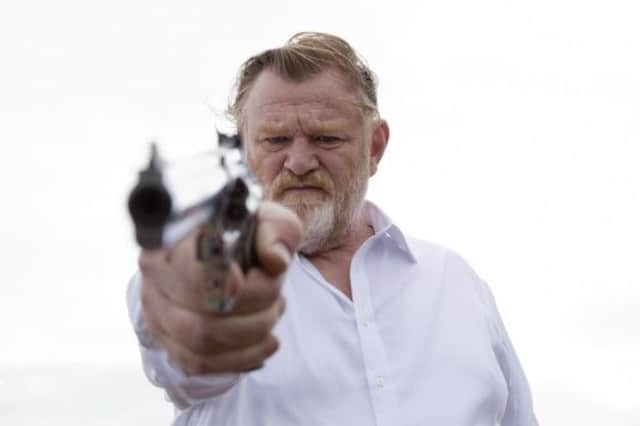Film review: Calvary (15)


Calvary (15)
Directed by: John Michael McDonagh
Starring: Brendan Gleeson, Chris O’Dowd, Kelly Reilly, Aiden Gillan, Dylan Moran
Star rating: * * *
As he did in that film, McDonagh – the brother of In Bruges director Martin McDonagh (whose work he both echoes here and has little digs at) – has a tendency to wrap offence-courting observations, mostly about Catholicism and paedophilia, in a blanket of self-aware irony that can sometimes make it feel as if he’s trying too hard to make a point.
Advertisement
Hide AdThe difference between this film and his debut, though, is that beneath all the annoyingly smug self-referential meta nonsense – characters that comment on their own purpose in the drama, dialogue that draws attention to its own function – he’s exploring serious themes rather than simply demonstrating his knowledge of how movies work.
This certainly helps make the film a little more enriching, with McDonagh using the sacrificial Christ allegory invoked by the title to grapple with the complexities of forgiveness in a society in which the Church has lost its moral authority.
That comes to the fore quickly courtesy of a pleased-with-itself opening in which an unseen man uses the confession box to inform Brendan Gleeson’s priest, Father James, that he intends to kill him in seven days time as punishment for the Church’s past sins against children – both in general and against himself in particular.
There’s nothing to be gained from killing a bad priest, this would-be murderer reasons, but killing a good priest will make a forceful statement.
What follows is a curious and contemplative procedural in which a burdened man walks inexorably towards his fate while trying to get to the root of what’s gone wrong in his parish and society in general.
Bringing him into contact with an array of wife-beaters, adulterers, prostitutes, would-be psychos, crooked financiers, atheists and arsonists, all flagrantly expressing their disdain for the Church, the film makes forceful connections between Catholicism’s silence on child abuse and a wider breakdown of society in which protection from its ills is predicated on having wealth and power in the first place.
Advertisement
Hide AdThough these points are punctuated with far too many annoying jokes and comic caricatures, the film does have a remarkable central figure in Father James. Gleeson plays him with such wry, tender and soul-shattering compassion he ends up making the film impossible to dismiss.
THIS WEEK’S FILM RELEASES
Half of a Yellow Sun (15)
Directed by: Biyi Bandele
Starring: Chiwetel Ejiofor, Thandie Newton, Anika Noni Rose, Joseph Mawle
Star rating; * *
Advertisement
Hide AdAdaptations of literary novels have a tendency to treat film as the dumber art form, stripping away narrative complexity instead of using cinema’s visual potential to translate big ideas on the page into big ideas on the screen. That’s the chief problem with Half of a Yellow Sun, Nigerian writer Chimamanda Ngozi Adichie’s acclaimed 2007 novel about the civil war that erupted in the wake of Nigerian independence. Director Biyi Bandele, the British-based Nigerian playwright who adapted the story for the big screen, has restructured the novel’s fractured narrative into a linear story about a British-educated Nigerian woman (Thandie Newton) who abandons her well-to-do family for a politically radical academic (Chiwetel Ejiofor) while her sister (Anika Noni Rose) falls for an ex-pat English writer (Joseph Mawle). Bandele – betraying his theatrical roots – is overly fond of stage-like compositions and expositional dialogue, both of which prevent us getting close to the characters in any meaningful way.
The Lunchbox (PG)
Directed by: Ritesh Batra
Starring: Irrfan Khan, Nimrat Kaur, Lillete Dubey
Star rating; * * * *
If the way to a man’s heart is through his stomach, does it matter if the wrong man’s heart is reached? That’s the starting point for this low-key Mumbai-set romantic dramedy in which a woman’s efforts to rekindle her marriage by sending her indifferent husband a passionately prepared lunch catalyses instead a tender epistolary relationship with another man when said meal is accidentally delivered to the wrong address.
Though this set-up makes it sound like the stuff of drippy Hollywood nonsense, it’s actually more Lost in Translation than Nicholas Sparks, with director Ritesh Batra adroitly choosing to keep the focus on the strength that his yearning protagonists provide one another instead of building towards a love-conquers-all fairytale ending.
The Quiet Ones (15)
Directed by: John Pogue
Starring: Jared Harris, Sam Claflin, Olivia Cooke, Erin Richards
Star rating: * *
This latest outing from the re-launched Hammer Films ignores the creepy promise of its title, blasting us instead with a constant barrage of amped-up sound effects, deathly screams and Slade’s Cum on Feel the Noize as the story plunges us into 1970s Britain and a case of possible demonic possession in the hallowed halls of Oxford University. Documented by a young cameraman (The Hunger Games’ Sam Claflin), the subsequent events are relayed in grainy 16mm found footage that fudges an already messy narrative comprised of cheap, seen-them-all-before shocks that drain the story of any real menace.
The Last Days on Mars (15)
Directed by: Ruairi Robinson
Starring: Liev Schreiber, Romola Garai, Olivia Williams, Elias Koteas
Star rating: * *
Advertisement
Hide AdActors surely know when they’re in a bad movie – the real trick is learning to distinguish between a “good” bad movie and a “bad” bad movie. Sadly, the over-qualified cast of this low-budget, Brit-made sci-fi snore-fest doesn’t seem to realise it’s in an example of the latter. As such, the determination to take seriously a zombies-in-space plot with Alien aspirations only increases the tedium.
The film’s re-animated life on Mars premise – fossilised evidence of bacteria turns out to be a nasty gene-mutating virus – is not without promise, but too much wooden dialogue, predictable plotting and generic shots of space-suited actors running through flashing lights fails to exploit that potential in a fun or interesting way.